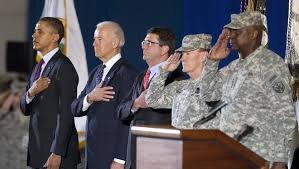Current Research
Current Research
The Civil-Military Perils of Presidentialism in America
Then-President Obama and Vice President Biden standing for the National Anthem at Joint Base Andrews
We posit that research on civ-mil relations in America generally ignores the effects of presidentialism's "invitation to struggle" between political factions and branches of government. Specifically, presidential institutions are designed to increase conflicts between civilians at multiple levels--within branches (legislature) and between branches (executive and legislature). In times of political upheaval with increase polarization and shifting social coalitions, which are classified as realignments in the US, these "struggles" become acute. Thus, there are many opportunities for (a) all civilian leaders being unable to monitor the military adequately, (b) sections of the military assuming partisan positions, and (c) the military being asked to intervene by one or more groups. We show, using anecdotal evidence, this has happened in other presidential systems, and that it has been occurring in the US since 2016.
City-Coups:
American Police Forces and City Governments
Police in Pittsburgh, in anticipation of protests in Summer 2020
Drawing from comparative politics research on military involvement in civilian politics, we present a theory about the effects of police militarization in America on the relationship between police forces and city governments' elected and administrative officials. Using evidence from news reports and scholarly studies, we show that police forces may be influencing and/or displacing elected and administrative officials in city governments because police forces have: (a) access to advanced weapons and training from the federal government, (b) independent sources of funding contingent on extraction from select populations as opposed to tax revenues, (c) support from locally dominant economic and racial groups, and (d) are politicized via unions. We subsequently present research methods and avenues through which a research program can be developed.
With Friends Like These:
Israel and Taiwan's Defense Ties with Central America
President Tsai Ing-Wen and President Daniel Ortega meet in Managua in January 2017
This paper explains the causes and effects of the ties between security challenged states preoccupied with preserving their own security and extra-regional non-major power states. By comparatively analyzing the defense ties of Israel and Taiwan with Central America, from the 1970s until the present, I find, they maintain relations due to shared ideologies and economic gain. Furthermore, Israel and Taiwan’s relations have centered on delivering defense equipment and training officers of Central American states’ security forces, and use bilateral and multilateral approaches. Most importantly, they support Central American states against internal and external threats. However, the findings do not support two explanations regarding Israel and Taiwan’s motivations: first, they maintained these relations to enhance their own security; and, second, they acted as surrogates for the United States in the region. The findings on the relationships’ effects on the Central American states also challenge a core assumption regarding the foreign policies of rogue states, a variety of security challenged states: that their foreign policies seek to destabilize other states.


